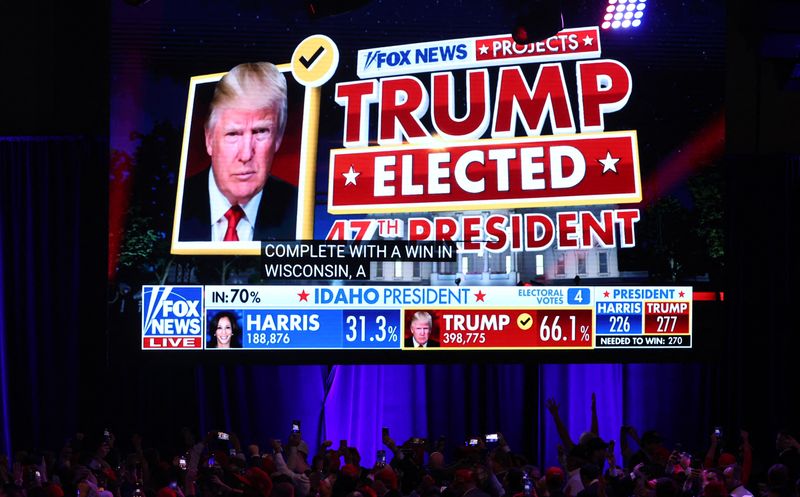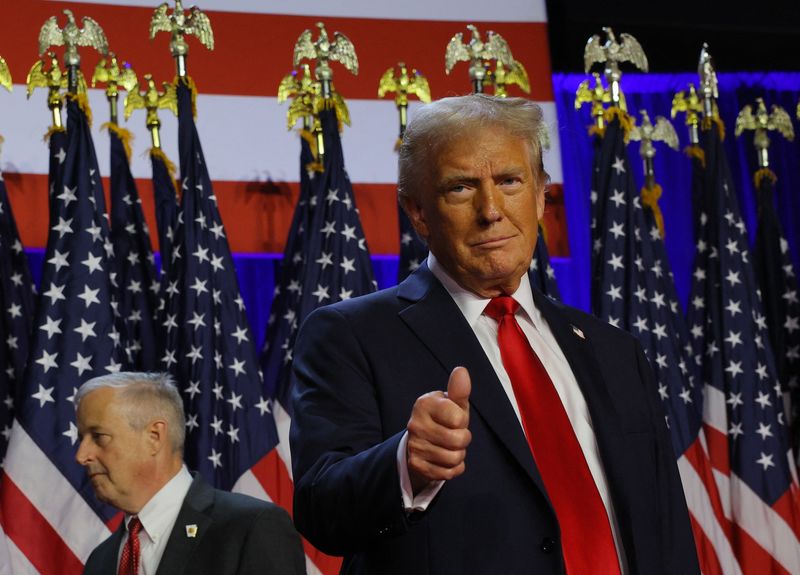By John Irish, Ingrid Melander
PARIS (Reuters) -The European Union must be united and coordinate closely in view of Donald Trump's coming return to the White House, the leaders of the bloc's two main powers, Germany and France, said on Wednesday after holding talks to coordinate their response.
French President Emmanuel Macron and German Chancellor Olaf Scholz congratulated Trump on Tuesday's election victory, but were also quick to stress the challenges posed by his "America First" protectionist trade policy and isolationist rhetoric.
"The European Union must stand close together and act in a united manner," Scholz told reporters, adding that he and Macron were coordinating closely with other EU heads of state and government.
Macron said on X that Berlin and Paris would work for a united, stronger Europe within "the new context".
Achieving European unity will however be challenging, not least because over the past years Paris and Berlin have been increasingly at odds on issues ranging from how to finance increased defence spending to trade, and in particular tariffs on China's electric cars.
The French and Germany leaders are also in delicate political positions at home, with Macron losing much of his power after defeats in elections earlier this year and Scholz struggling to keep his coalition together.
"Contrary to claims, Europe is not prepared for the economic impact of higher tariffs, the likely U-turn on Ukraine, and defence spending ultimatums – we expect the EU to divide on similar lines to the US itself," Eurointelligence analysts said.
TRADE WARS?
Many European officials had said ahead of Tuesday's election they were worried about a Trump win, given tense transatlantic relations in his first term, his strong criticism of NATO, his ambivalent view of Ukraine's fight against Russia's invasion and stance on climate change.
One particular concern for Europe is trade: Trump said last month the European Union would have to "pay a big price" for not buying enough American exports if he won the election.
European Commission chief Ursula von der Leyen congratulated the Republican former president on his victory but also said avoiding trade wars would be in the U.S interest as well as Europe's.
"Millions of jobs and billions in trade and investment on each side of the Atlantic depend on the dynamism and stability of our economic relationship," she said.
Trump, who will take office in January, has said he would impose a 10% tariff on imports from all countries, and 60% duties on imports from China. This would hit supply chains throughout the world, likely raising costs, and China seeking to divert its exports towards Europe, economists warn.
UKRAINE
Another worry for Europe is shifting U.S. foreign policy, in particular on the war in Ukraine. Trump has criticised the level of U.S. support for Ukraine's war effort and before the election promised to end the conflict before even taking office, without explaining how.
Hungary's nationalist Prime Minister Viktor Orban, who unlike other EU leaders had openly endorsed Trump's presidential bid and posted enthusiastic messages on X on his victory, said Europe would now need to rethink its support of Ukraine. Orban has regularly angered Brussels with his close ties to Russia and opposition to aid for Ukraine.
NATO chief Mark Rutte was among many others in Europe who congratulated Trump and hoped for good cooperation, with several ministers saying his return to the White House would require Europe to take greater responsibility for its security.
"We must now think big and make big investments in our European security," German Foreign Minister Annalena Baerbock told reporters in Berlin.

France and Germany's defence ministers were due to hold a hastily arranged meeting later on Wednesday in Paris, ahead of long-planned meetings of dozens of European leaders in Budapest on Thursday for a European Political Community summit and a meeting of EU leaders, also in Budapest, after that.
The EU summit will allow for a first exchange of views but was unlikely to bring a full response to Trump's win, one European diplomat said.
